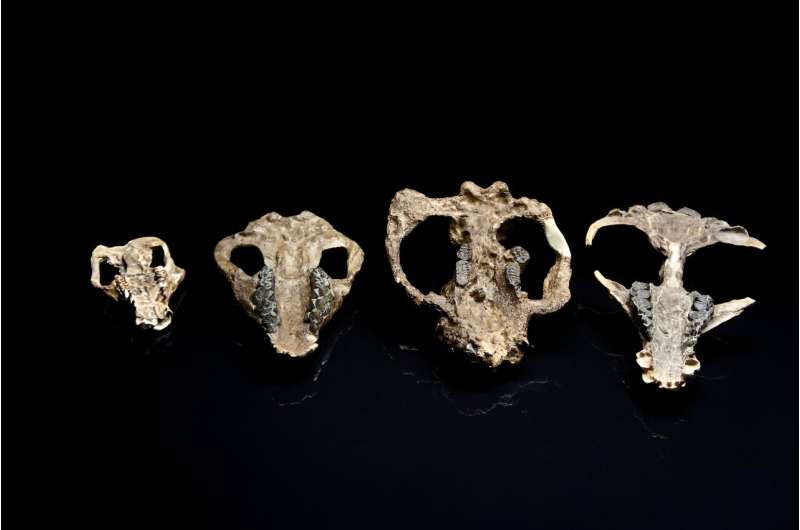This article has been reviewed according to Science X's editorial process and policies. Editors have highlighted the following attributes while ensuring the content's credibility:
fact-checked
trusted source
proofread
Q&A: An asteroid killed the dinosaurs, allowing mammals to dominate Earth, but why?

Almost 66 million years ago, an asteroid struck the Earth, killing all non-avian dinosaurs and allowing mammals to dominate.
But just how did we evolve from rat-like creatures running between the feet of dinosaurs to take over their ecological niches? Dr. Kendra Chritz, assistant professor in the UBC department of earth, ocean and atmospheric sciences, aims to find out.
Dr. Chritz is co-leading a new research project to learn how ecosystems and organisms recover after a catastrophic, climate-changing event. She explains in this Q&A that clues may lie in the fossilized teeth of mammals.
Why don't we know much about how mammals rose to dominate the Earth?
The Cretaceous-Paleogene extinction event was a really tumultuous time in Earth's history, when a cataclysmic extinction event killed off 75% of the planet's species. It set Earth on a course to become the world that we have today. If that hadn't happened, we'd still be tiny rat-like creatures, living underground and running between dinosaur feet.
We don't know much about this period because fossils of smaller organisms tend to not preserve as well as larger organisms. The fossils are delicate and can become easily damaged over millions of years. Luckily, a few years ago, researchers found a rich trove of mammal fossils from this time period in Colorado a few years ago. We'll use fossils collected previously from this site, in addition to new fossils dug up by a team led by paleontologists based out of the Denver Museum of Nature and Science.
How will you use teeth to explore this?
My lab will look at the chemistry of fossilized material in order to explore the ecology and behavior of organisms through time. We mostly look at teeth because they are very well preserved in the fossil record. They're like rocks in your mouth—highly mineralized, very dense, and they don't change throughout the course of your life. All the chemical elements and signatures of your life, such as the climate you're living in, what you're eating, where you are in the food web and more, are stored in your teeth.
We will sample these mammal fossils after the asteroid struck and we hope to see an expansion of mammal diet and ecology over one million years immediately after the extinction of the dinosaurs. We want to pinpoint when mammals started to evolve and diversify, and how quickly their evolution took place once dinosaurs were gone. We'll also explore whether environmental changes, including the appearance of different kinds of plants, or changes in climate, align with differences in tooth shape, body size, brain size and ecology. For instance, this is the first time we see beans appear on the planet—did this correspond with a different type of tooth with which mammals could eat them?
What is the connection between climate change and this mass extinction?
This was a period of lightning-fast climate and biodiversity changes. This project will explore how the biodiversity of ecosystems recovers after such an event and may provide data to predict the long-term consequences of our current rapid changes in climate and biodiversity.
There are a lot of parallels with the current climate situation and this mass extinction event. Although the asteroid hit in one day, geologically speaking, current climate change is happening in the blink of an eye as well. And while the aftermath of the asteroid was different from what we're experiencing now, this project could give us insight into how quickly the planet recovers after a sudden mass extinction event.
It's important to think long-term about ecosystems and the continuation of our and other species. It's taken hundreds of millions of years for the planet to get to this point, and we carry the records of our evolution within our own bodies. With this project, we want to explore history more deeply, zooming in on what the planet was like following a traumatic global event, and hopefully this research will provide some important lessons for the future.
Provided by University of British Columbia





















